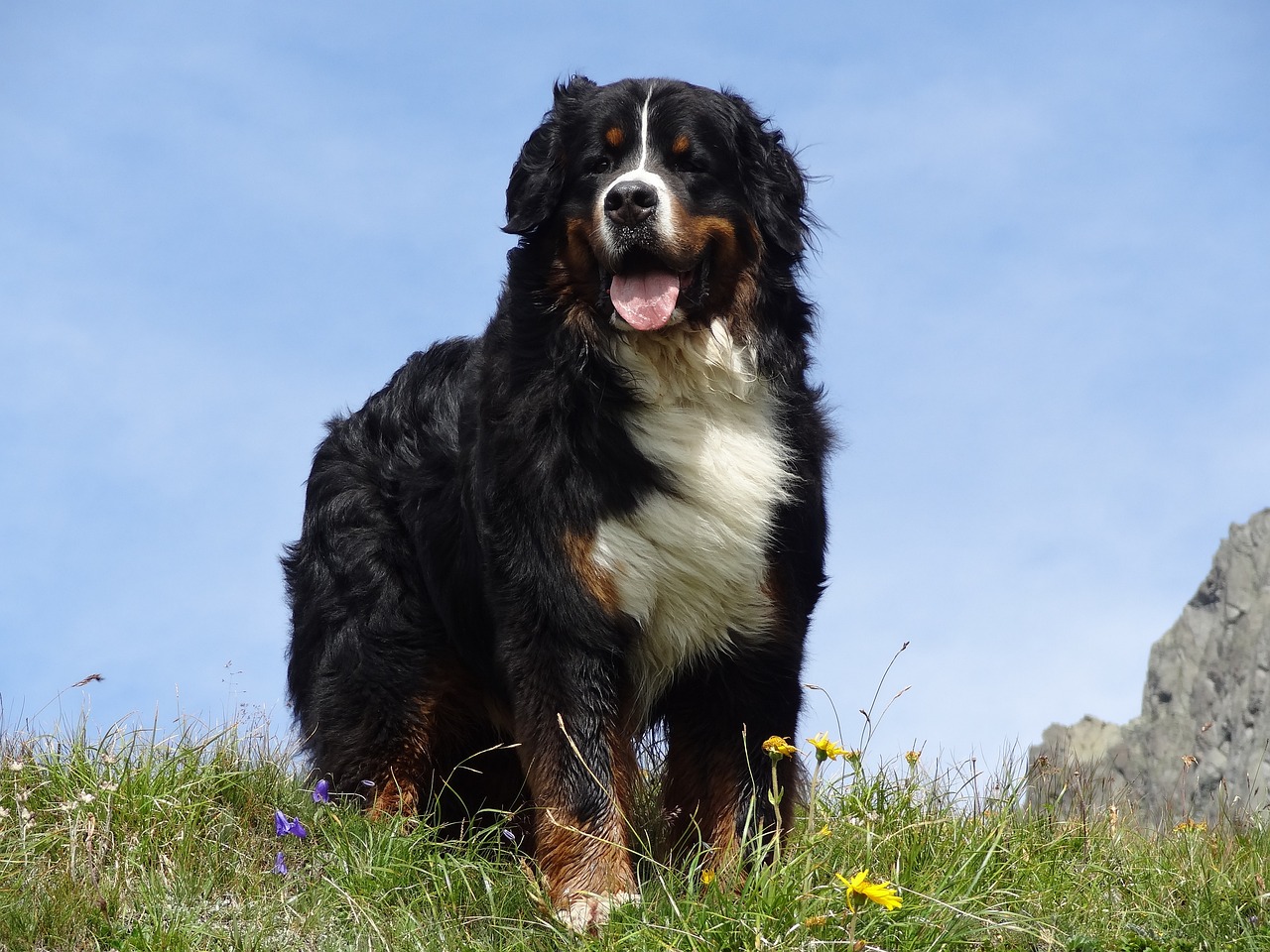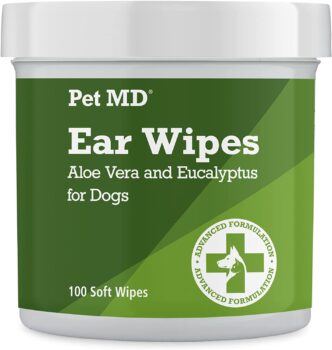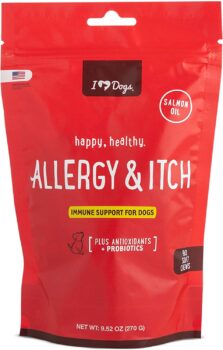Bernese Mountain Dogs, known for their gentle temperament, loyalty, and distinctive tri-colored coat, are a favorite among dog lovers. However, their floppy ears, which contribute to their adorable appearance, are prone to ear infections. This article outlines 11 effective ways to treat and prevent ear infections in Bernese Mountain Dogs, emphasizing the importance of Omega-3 in their diet to combat allergies.

iHeartDogs is reader supported. Some of the links below may be paid affiliate links, where we receive a small commission on a product at no additional cost to you.
1. Regular Ear Cleaning and Checks
The foundation of ear infection prevention lies in routine ear cleaning and checks. Be vigilant for signs of ear infections such as redness, a foul smell, or unusual discharge. Use a vet-recommended ear cleaner to safely remove debris from your dog’s ears.
Our favorite ear cleaner is these PetMD brand ear wipes on Amazon.
2. Thorough Drying After Baths or Swimming
Bernese Mountain Dogs have a deep love for water, but the residual moisture can become a breeding ground for bacteria. Ensure you dry your dog’s ears thoroughly after they come into contact with water.
3. Incorporation of Omega-3 Fatty Acids in Diet
The role of Omega-3 fatty acids in combating allergies cannot be overstated. Acting as powerful anti-inflammatory agents, they can help stave off ear infections caused by allergic reactions. Sources of Omega-3 include cold-water fish, flaxseeds, and certain specially-formulated dog foods.
We’re fans of this Norwegian salmon oil on Amazon. It’s a bright orangish-pink color and has no fishy smell at all due to it’s ultra high purity.
4. Regular Vet Visits
Routine vet check-ups can help in the early detection of potential ear infections. The vet can also provide a professional ear cleaning service, reducing the likelihood of infections.
5. Allergen Avoidance
Identify and avoid allergens that could trigger allergies leading to ear infections in your Bernese Mountain Dog. These can include specific foods, dust mites, and pollens.
A few good supplements to help your dog’s allergies are apple cider vinegar, quercetin, and colostrum, all of which are found in many natural allergy supplements like this one.
6. Up-to-date Vaccinations and Parasite Control
Ensure your Bernese Mountain Dog is up-to-date with all vaccinations and maintains regular parasite control. A healthy immune system can better combat infections, including those in the ear.
7. Administration of Prescription Medications
In the event of an ear infection, your vet may prescribe medications, such as antibiotics or antifungal drugs. Adhere to the prescribed dosage and course of treatment for the best results.
8. Consideration of Surgery in Chronic Cases
For severe or chronic ear infections, surgery to improve the structure of the ear canal may be an option. Discuss this with your vet to make an informed decision.
9. Balanced Gut Health with Probiotics
Probiotics can help maintain a balanced gut microbiome, contributing to a healthy immune system. Incorporating probiotics in your dog’s diet can strengthen their defenses against infections.
10. Usage of E-Collars
During an ear infection, e-collars can prevent your dog from scratching their ears and aggravating the condition. It aids in the healing process by preventing further injury.
11. Maintenance of Overall Hygiene
Keeping your Bernese Mountain Dog’s environment clean can prevent a multitude of health issues, including ear infections. Regularly clean their bedding, toys, and food and water bowls.
FAQs on Ear Infections in Bernese Mountain Dogs
1. Q: How can I tell if my Bernese Mountain Dog has an ear infection?
A: Watch for signs such as frequent ear scratching, head shaking, abnormal discharge, swelling, redness, and foul odor. If you notice any of these symptoms, consult your vet.
2. Q: Are Bernese Mountain Dogs more susceptible to ear infections?
A: Yes, their floppy ear structure can trap moisture and debris, making them more prone to ear infections.
3. Q: How often should I clean my Bernese Mountain Dog’s ears?
A: A weekly cleaning is generally sufficient for healthy dogs. However, if your dog has a history of ear infections, more frequent cleaning may be necessary.
4. Q: Can diet prevent ear infections in Bernese Mountain Dogs?
A: A balanced diet enriched with Omega-3 fatty acids can boost your dog’s immune system and reduce inflammation associated with allergies, thereby helping to prevent ear infections.
5. Q: Can ear infections cause permanent damage?
A: If left untreated, ear infections can lead to serious problems like hearing loss. Prompt treatment is therefore crucial.
6. Q: Can I use human ear infection medicine on my dog?
A: No. Always use medicines prescribed by your vet, as human medicines may not be safe for dogs and can exacerbate the problem.
7. Q: What are the common allergens for Bernese Mountain Dogs?
A: Common allergens can include certain food ingredients, dust mites, pollen, and some cleaning products.
8. Q: How can I incorporate Omega-3 in my dog’s diet?
A: Omega-3 can be added through supplements, or by feeding your dog Omega-3 rich foods like fish or flaxseeds.
9. Q: Can I prevent ear infections in my Bernese Mountain Dog?
A: While not all ear infections can be prevented, regular ear cleaning, a balanced diet, and limiting exposure to allergens can significantly reduce the risk.
10. Q: What should I do if my dog’s ear infection keeps recurring?
A: Chronic ear infections may suggest an underlying problem, such as allergies or an anatomical abnormality. Consult your vet for a thorough examination and treatment plan.
By understanding and implementing these measures, you can effectively manage and prevent ear infections in your Bernese Mountain Dog, ensuring their well-being. Always remember, early detection and treatment are key to averting long-term complications.



 Toledo, United States.
Toledo, United States.
